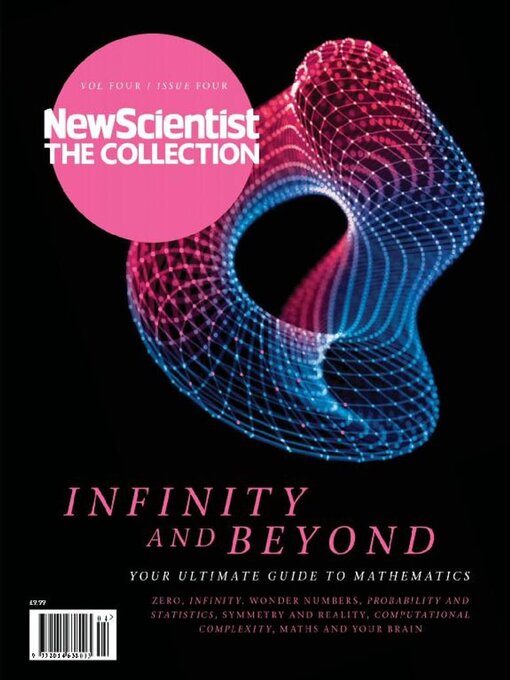New Scientist covers discoveries and ideas in science and technology that will change your life and the way you understand the world. New Scientist employs and commissions the best writers in their fields to provide in-depth but accessible coverage of the developments that matter. New Scientist: The Collection is a themed compilation of recent articles and special reports from our back catalogue, providing a book-length examination of some of the deepest questions known to humanity.
Learn the language of reality
THE ORIGIN OF MATHEMATICS • It’s our most effective tool for understanding the universe. But where it comes from and how it developed remain mysterious, finds
THE PILLARS OF MATHEMATICS
ANIMAL INSTINCTS
WHY DO PEOPLE HATE MATHS?
It doesn’t add up • The foundations of mathematics might not be as solid as they appear, says Richard Elwes
Bound not to work
The colour of numbers
A ladder of infinities
No good with numbers • What makes otherwise intelligent people useless at mathematics? Laura Spinney investigates
ONE, TWO, LOTS
Seduced by numbers • Mathematician Manya Raman Sundström thinks some of us have an inbuilt maths drive, a bit like a sex drive
Pairing the primes • What makes prime numbers clump in twos? If only we knew, says mathematician Vicky Neale
Prime problems • The riddle of the never-ending pairs is not the only mystery of the prime numbers
Wonders of numberland • Prime numbers are just the beginning of the number story. Numbers and patterns of numbers have all sort of uses both practical and impractical – even when they are entirely imaginary...
Euler’s number • Why things don’t grow forever
The golden ratio • The most beautiful number ever?
Graham’s number • The biggest number with a name of its own
2 74,207,281 -1 • The force behind encryption
CREDIT CHECK
The Laplace limit • Why we don’t stray far from the sun
The Lyapunov exponent • The boundary of chaos
From zero to hero • A concept of zero is essential for arithmetic to work smoothly – why then did the idea take so long to catch on? Richard Webb follows its convoluted path
Nothing in common • A collection of nothings means everything to mathematics, as Ian Stewart explains
Ultimate logic • The mysteries of infinity could lead us to a fantastic structure above and beyond mathematics as we know it, says Richard Elwes
HOW TO THINK ABOUT INFINITY
The infinity illusion • Abandon the idea that some things never end, and the universe might start making more sense, says Amanda Gefter
Careless pork costs lives... ...and other medical myths • It’s not just tabloid newspapers that misrepresent medical statistics for dramatic effect, warn Marianne Freiberger and Rachel Thomas
Scary or not? • Different ways of presenting the same data can greatly influence our perception of risk
SIZE MATTERS • Clinical trial design
HOW TO PLAY THE GAME • Game theory is the science of strategic thinking – grasp it to win at life
HOW NUMBERS GROW • The law of exponential growth can make or break you
HOW TO THINK ABOUT PROBABILITY THE MONTY HALL PROBLEM • Suppose you're on a game show, and you're given the choice of three doors
PROBABILITY WARS • Can’t get your head around uncertainty? You’re in good company, says Regina Nuzzo
THE BOOKIE ALAN GLYNN • Head of Sports Trading at bookmakers Paddy Power
THE GAMBLER VANESSA SELBST • Highest earning female poker player of all time
Justice you can count on • A poor grasp of probability can lead to all sorts of legal problems, says Angela Saini
Bayes on...

